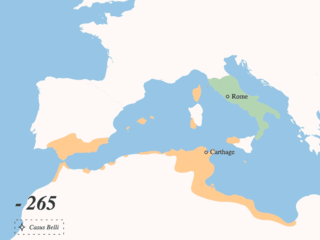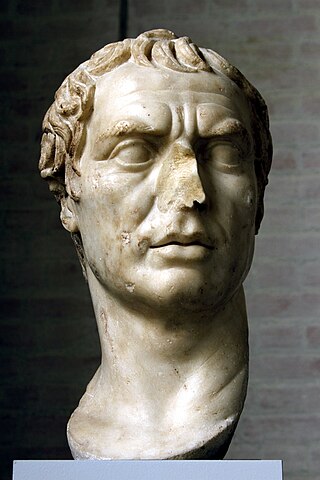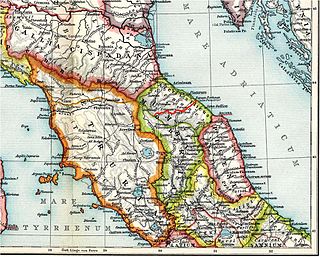
The First Punic War was the first of three wars fought between Rome and Carthage, the two main powers of the western Mediterranean in the early 3rd century BC. For 23 years, in the longest continuous conflict and greatest naval war of antiquity, the two powers struggled for supremacy. The war was fought primarily on the Mediterranean island of Sicily and its surrounding waters, and also in North Africa. After immense losses on both sides, the Carthaginians were defeated and Rome gained territory from Carthage.

The Punic Wars were a series of wars between 264 and 146 BC fought between the Roman Republic and Ancient Carthage. Three wars took place, on both land and sea, across the western Mediterranean region and involved a total of forty-three years of warfare. The Punic Wars are also considered to include the four-year-long revolt against Carthage which started in 241 BC. Each war involved immense materiel and human losses on both sides.

The Second Punic War was the second of three wars fought between Carthage and Rome, the two main powers of the western Mediterranean in the 3rd century BC. For 17 years the two states struggled for supremacy, primarily in Italy and Iberia, but also on the islands of Sicily and Sardinia and, towards the end of the war, in North Africa. After immense materiel and human losses on both sides, the Carthaginians were once again defeated. Macedonia, Syracuse and several Numidian kingdoms were drawn into the fighting, and Iberian and Gallic forces fought on both sides. There were three main military theatres during the war: Italy, where Hannibal defeated the Roman legions repeatedly, with occasional subsidiary campaigns in Sicily, Sardinia and Greece; Iberia, where Hasdrubal, a younger brother of Hannibal, defended the Carthaginian colonial cities with mixed success before moving into Italy; and Africa, where Rome finally won the war.

The Third Punic War was the third and last of the Punic Wars fought between Carthage and Rome. The war was fought entirely within Carthaginian territory, in what is now northern Tunisia. When the Second Punic War ended in 201 BC one of the terms of the peace treaty prohibited Carthage from waging war without Rome's permission. Rome's ally, King Masinissa of Numidia, exploited this to repeatedly raid and seize Carthaginian territory with impunity. In 149 BC Carthage sent an army, under Hasdrubal, against Masinissa, the treaty notwithstanding. The campaign ended in disaster as the Battle of Oroscopa ended with a Carthaginian defeat and the surrender of the Carthaginian army. Anti-Carthaginian factions in Rome used the illicit military action as a pretext to prepare a punitive expedition.
Hamilcar Barca or Barcas was a Carthaginian general and statesman, leader of the Barcid family, and father of Hannibal, Hasdrubal and Mago. He was also father-in-law to Hasdrubal the Fair.
The Battle of Zama was fought in 202 BC in what is now Tunisia between a Roman army commanded by Scipio Africanus and a Carthaginian army commanded by Hannibal. The battle was part of the Second Punic War and resulted in such a severe defeat for the Carthaginians that they capitulated, while Hannibal was forced into exile. The Roman army of approximately 30,000 men was outnumbered by the Carthaginians who fielded either 40,000 or 50,000; the Romans were stronger in cavalry, but the Carthaginians had 80 war elephants.

The siege of Carthage was the main engagement of the Third Punic War fought between Carthage and Rome. It consisted of the nearly-three-year siege of the Carthaginian capital, Carthage. In 149 BC, a large Roman army landed at Utica in North Africa. The Carthaginians hoped to appease the Romans, but despite the Carthaginians surrendering all of their weapons, the Romans pressed on to besiege the city of Carthage. The Roman campaign suffered repeated setbacks through 149 BC, only alleviated by Scipio Aemilianus, a middle-ranking officer, distinguishing himself several times. A new Roman commander took over in 148 BC, and fared equally badly. At the annual election of Roman magistrates in early 147 BC, the public support for Scipio was so great that the usual age restrictions were lifted to allow him to be appointed commander in Africa.

The Battle of Lake Trasimene was fought when a Carthaginian force under Hannibal Barca ambushed a Roman army commanded by Gaius Flaminius on 21 June 217 BC, during the Second Punic War. The battle took place on the north shore of Lake Trasimene, to the south of Cortona, and resulted in a heavy defeat for the Romans.
The Battle of Panormus was fought in Sicily in 250 BC during the First Punic War between a Roman army led by Lucius Caecilius Metellus and a Carthaginian force led by Hasdrubal, son of Hanno. The Roman force of two Roman and two allied legions defending the city of Panormus defeated the much larger Carthaginian army of 30,000 men and between 60 and 142 war elephants.

The gens Marcia, occasionally written Martia, was one of the oldest and noblest houses at ancient Rome. They claimed descent from the second and fourth Roman Kings, and the first of the Marcii appearing in the history of the Republic would seem to have been patrician; but all of the families of the Marcii known in the later Republic were plebeian. The first to obtain the consulship was Gaius Marcius Rutilus in 357 BC, only a few years after the passage of the lex Licinia Sextia opened this office to the plebeians.

The Battle of Ibera, also known as the Battle of Dertosa, was fought in the spring of 215 BC on the south bank of the Ebro River near the town of Ibera and was part of the Second Punic War. A Roman army, under the command of the brothers Gnaeus and Publius Scipio, defeated a similarly sized Carthaginian army under Hasdrubal Barca. The Romans, under Gnaeus Scipio, had invaded Iberia in late 218 BC and established a foothold after winning the Battle of Cissa. This lodgement, on the north-east Iberian coast, between the Ebro and the Pyrenees, blocked the route of any reinforcements from Iberia for the army of Hannibal, who had invaded Italy from Iberia earlier in the year. Hasdrubal attempted to evict the Romans in 217 BC, but this ended in defeat when the Carthaginian naval contingent was mauled at the Battle of Ebro River.

The battle of the Great Plains was fought in 203 BC in modern Tunisia between a Roman army commanded by Publius Cornelius Scipio, and allied Carthaginian and Numidian armies commanded by Hasdrubal Gisco and Syphax respectively. The battle was part of the Second Punic War and resulted in a heavy defeat for Carthage.
The Battle of Cirta was fought in 203 BC between an army of largely Masaesyli Numidians commanded by their king Syphax and a force of mainly Massylii Numidians led by Masinissa, who was supported by an unknown number of Romans under the legate Gaius Laelius. It took place somewhere to the east of the city of Cirta and was part of the Second Punic War. The numbers engaged on each side and the casualties suffered are not known.
Manius Manilius was a Roman Republican orator and distinguished jurist who also had a long military career. It is unclear if he was related to the Manius Manilius who was degraded by Cato the Censor for embracing his wife in broad daylight in Cato's censorship from 184 BC to 182 BC.

The battle of Utica was fought in 203 BC between a Roman army commanded by Publius Cornelius Scipio and the allied armies of Carthage and Numidia, commanded by Hasdrubal Gisgo and Syphax respectively. The battle was part of the Second Punic War and resulted in a heavy defeat for Carthage.
The gens Manilia was a plebeian family at ancient Rome. Members of this gens are frequently confused with the Manlii, Mallii, and Mamilii. Several of the Manilii were distinguished in the service of the Republic, with Manius Manilius obtaining the consulship in 149 BC; but the family itself remained small and relatively unimportant.
The Battle of Lake Tunis was a series of engagements of the Third Punic War fought in 149 BC between the Carthaginians and the Roman Republic. Roman consuls Manius Manilius and Lucius Marcius Censorinus, leading separate forces, made several unsuccessful attempts to breach the walls of Carthage. Later, the Carthaginians launched fire ships, which destroyed most of the Roman fleet. Eventually Censorinus returned to Rome, leaving Manilius to continue fighting.

The Battle of Silva Litana was an ambush that took place in a forest 75 miles northwest of the Roman city of Ariminum during the Second Punic War in 216 BC. The Gallic Boii surprised and destroyed a Roman army under the consul-elect Lucius Postumius Albinus. Of 25,000 Romans, only 10 survived, with a few being taken prisoner by the Gauls. The corpse of Postumius was decapitated and his skull was made into a gilded ceremonial cup by the Boii. News of this military disaster probably reached Rome after the defeat at Cannae in the fall of 216 BC or the spring election of consuls for 215 BC, triggering a renewed panic. The Romans were compelled to postpone military operations against the Gauls until the conclusion of the Second Punic War, sending only two legions to guard against additional Gallic attacks. However, the Boii and Insubres did not attempt to exploit their victory. Cisalpine Gaul remained in relative peace until 207 BC, when Hasdrubal Barca arrived there with his army from Spain.
Hasdrubal was a Carthaginian general who served during the middle years of the First Punic War, fought between Carthage and Rome, and took a leading part in three of the four major field battles of the war. He was a citizen of the city state of Carthage, which was in what is now Tunisia. His date of birth and age at death are both unknown, as are his activities prior to his coming to prominence in 255 BC. Modern historians distinguish him from other Carthaginians named Hasdrubal by the cognomen "son of Hanno".
The Battle of Oroscopa was fought between a Carthaginian army of more than 30,000 men commanded by the general Hasdrubal and a Numidian force of unknown size under its king, Masinissa. It took place in late 151 BC near the ancient town of Oroscopa in what is now north western Tunisia. The battle resulted in a heavy Carthaginian defeat.











